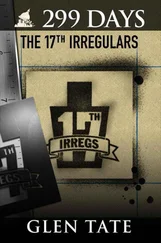Glen Tate - 299 Days - The Preparation
Здесь есть возможность читать онлайн «Glen Tate - 299 Days - The Preparation» весь текст электронной книги совершенно бесплатно (целиком полную версию без сокращений). В некоторых случаях можно слушать аудио, скачать через торрент в формате fb2 и присутствует краткое содержание. Город: Augusta, ME, Год выпуска: 2012, ISBN: 2012, Издательство: PrepperPress, Жанр: sf_postapocalyptic, на английском языке. Описание произведения, (предисловие) а так же отзывы посетителей доступны на портале библиотеки ЛибКат.
- Название:299 Days: The Preparation
- Автор:
- Издательство:PrepperPress
- Жанр:
- Год:2012
- Город:Augusta, ME
- ISBN:978-0615680682
- Рейтинг книги:3 / 5. Голосов: 1
-
Избранное:Добавить в избранное
- Отзывы:
-
Ваша оценка:
- 60
- 1
- 2
- 3
- 4
- 5
299 Days: The Preparation: краткое содержание, описание и аннотация
Предлагаем к чтению аннотацию, описание, краткое содержание или предисловие (зависит от того, что написал сам автор книги «299 Days: The Preparation»). Если вы не нашли необходимую информацию о книге — напишите в комментариях, мы постараемся отыскать её.
299 Days: The Preparation
299 Days: The Preparation — читать онлайн бесплатно полную книгу (весь текст) целиком
Ниже представлен текст книги, разбитый по страницам. Система сохранения места последней прочитанной страницы, позволяет с удобством читать онлайн бесплатно книгу «299 Days: The Preparation», без необходимости каждый раз заново искать на чём Вы остановились. Поставьте закладку, и сможете в любой момент перейти на страницу, на которой закончили чтение.
Интервал:
Закладка:
The warm joyous feeling wouldn’t go away. Grant needed to try to be sympathetic.
“What about state employees?” Grant asked. “What kind of cuts will there be?” He was trying to keep the topic on things that affected her.
“No raises this year,” she said. “No increases for the pensions. Furloughs for five days a year.”
“How much will that save?” Grant asked.
“The Governor’s Office thinks $98 million over two years,” Jeanie said.
“That’s a drop in the bucket when you’re looking at $5.7 billion,” Grant said.
“That’s all they think the unions will tolerate,” Jeanie said.
Taxes would go up — way, way up — but there was a limit to what people could pay.
Jeanie added, “The state can’t borrow any more money.” Grant, who had become an expert on the state constitution from all the cases he worked on, knew why. The constitution limited state borrowing to 9% of tax revenue. Revenue was down, way down, and 9% of it wouldn’t come close to the $5.7 billion.
Grant said, “The State of Washington has maxed out its credit card.” That was quite an astounding statement.
It got worse. The $5.7 billion deficit and maxing out of the state’s credit card was just the present problem. The problem for the next few years was the pensions as a huge wave of state employees would start retiring and collecting their pensions. The amount of the actual shortage in the state pension system was a closely guarded secret, but the rumor was that the deficit was about $20 billion, which was about two years of the state’s entire discretionary spending. In just a few years, the pension checks would start bouncing, unless taxes were raised to levels so high that no one in their right minds would get up and go to work. There was no way to avoid this. Unless, of course, pension benefits were drastically reduced. Everyone knew that wouldn’t happen. Retired union state employees were a huge voting block. The politicians would never do it willingly.
But, future events would force their hand. It was inevitable. Those greedy politician bastards created this system, knowing it would fail. They knew it, but they’d be out of office by the time it all fell apart.
After a long contemplative pause, Jeanie said, “Just about everyone I know is a state employee. Jim is. I am. Just about everyone in my neighborhood is.”
“Same in my neighborhood,” Grant said. He started mentally going up and down the houses on his street. He didn’t know most of his neighbors’ names, but, strangely, knew what agencies they worked for. The people on his cul-de-sac were the director of the Office of Women and Minority Business, the assistant state treasurer, a recently retired assistant director of the state education department, a biologist with the state game department, the soon-to-retire budget head of the Department of Ecology, and an administrative appeals judge. The only two private-sector families on the cul-de-sac were his family and the Spencers. That was it. Obviously, Olympia was different than other places because it was the state capitol. But still.
Grant started to think what would happen if the state had to lay off a third or half of them or if paychecks started to bounce. What would the people on his street do?
They would freak out. Big time. They would be stunned at first, and then they would get angry at the taxpayers who hadn’t allowed taxes to keep going up to fund their jobs. Grant remembered Sean, the Governor’s legislative director’s statement, “That’s our money. We need it.”
The people in Grant’s neighborhood would get desperate, because all they knew how to do was government work, and if they were unemployed then several hundred thousand others would be too, and the tiny number of private-sector jobs left would have long lines of applicants. If the state checks stopped coming, these people were totally screwed. They would assume that there would be government programs for them like mortgage assistance and utility bill reductions. But that wasn’t likely. If there wasn’t enough money to pay state employees, there wouldn’t be enough to give everyone handouts. This was real. The State of Washington could collapse.
There was that joyous warmth again. Collapse is what is needed. Not wanted, but needed. Grant thought about the years of work he and people at WAB had done to predict that spending was out of control and that something needed to be done or the sudden and drastic cuts would be devastating. No one listened. In fact, they mocked people like him sounding the alarm.
A collapse would be awful, but there was no political way to trim spending and get the government back into the role it was supposed to have: doing a few things well, like police protection, but not becoming bigger than the private sector. However, the system was dysfunctional. It was out of control. Some furloughs and no raises was all the system could do to plug a hole of half the money it could spend. It couldn’t borrow any more money.
Grant whispered, “It’s finally happening.”
Jeanie was still silent on the other end of the phone.
He felt like he was watching a car crash, but smiling at the same time because he told the driver a thousand times not to drive on the wrong side of the road. He was feeling horror and “I told you so” at the same time. Like the impending car crash, Grant couldn’t do anything about it; not a thing. All he could do was be sure that he wasn’t in the car when it crashed. He couldn’t save the people who had decided to do really stupid things over and over again. He had tried.
All he could do was watch. Then it would be up to him to render first aid and clean up the wreckage. He would clean up after the mess because he had to, but the whole time he would be shaking his head and muttering, “Dumb asses.”
Grant started thinking about the part about him not being in the car when it crashed. He had taken steps, at the risk of his wife finding out and being furious, to take care of his family and shield them from the coming collapse. He thought about the food, the cabin, the guns, and the network of people with vital skills. His family was taken care of because he got off his ass and did it. He was a man. He took care of his family. That made him smile.
Chapter 32
You Done Good
In the middle of this budget crisis and political gloom, Grant had an escape; his cabin. He went out there every chance he got.
The only thing better than being at his cabin was being there with friends and family. Manda came out all the time and Cole was out there pretty regularly. Lisa came out when they had family friends out.
Grant loved having his friends out there, but limited the ones he invited. He didn’t want too many people to know where the cabin was. He certainly didn’t show them the food and ammo.
One of his first “guy’s weekend” guests was Steve Briggs from Forks. Grant wanted to show Steve how cool the cabin was, and drink a lot of beer.
Steve came out one glorious June day. It was seventy-five degrees and sunny.
When he drove up, Steve rolled down his window and said “Whoa. You done good.”
Grant gave him the tour and they sat in comfy lounge chairs on the deck and drank for a few hours. They had a long conversation about Forks, all the Civil Air Patrol stories, leaving Forks, and the time Steve saved Grant’s life on Goat Island.
During their conversation, the topic turned to the seemingly inevitable collapse. It all started when Steve said the same phrase he said in Forks years earlier that got Grant prepping.
“This is a false economy,” he said when he was talking about how all the car parts at his store were made in China and arrived through a just-in-time inventory system. This was Grant’s opportunity to have “the conversation” with Steve.
Читать дальшеИнтервал:
Закладка:
Похожие книги на «299 Days: The Preparation»
Представляем Вашему вниманию похожие книги на «299 Days: The Preparation» списком для выбора. Мы отобрали схожую по названию и смыслу литературу в надежде предоставить читателям больше вариантов отыскать новые, интересные, ещё непрочитанные произведения.
Обсуждение, отзывы о книге «299 Days: The Preparation» и просто собственные мнения читателей. Оставьте ваши комментарии, напишите, что Вы думаете о произведении, его смысле или главных героях. Укажите что конкретно понравилось, а что нет, и почему Вы так считаете.











